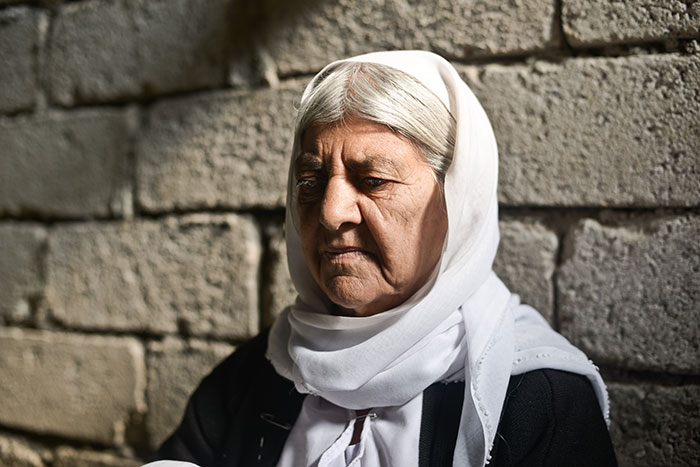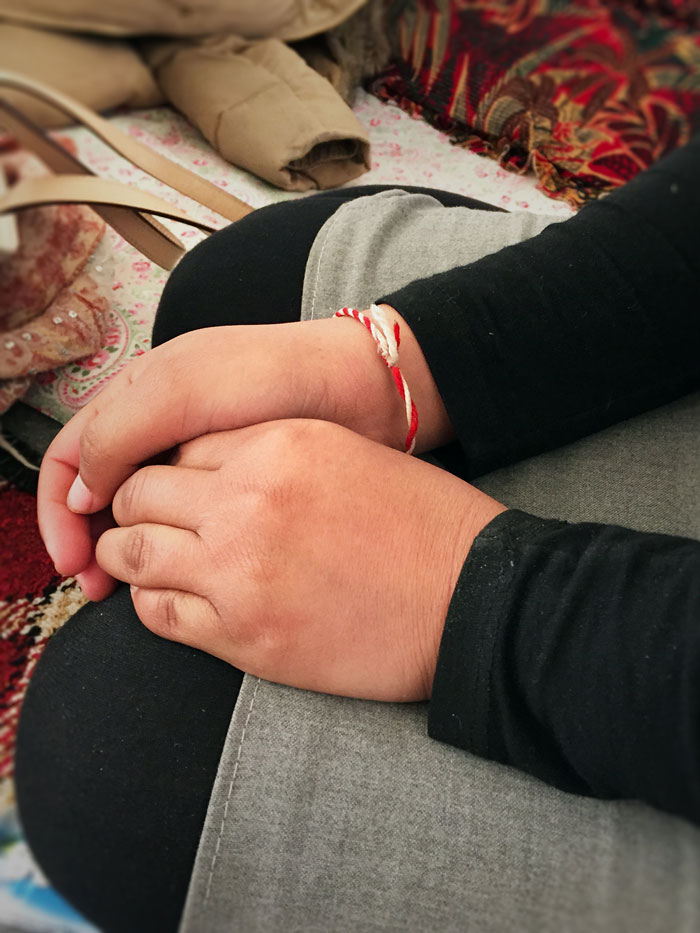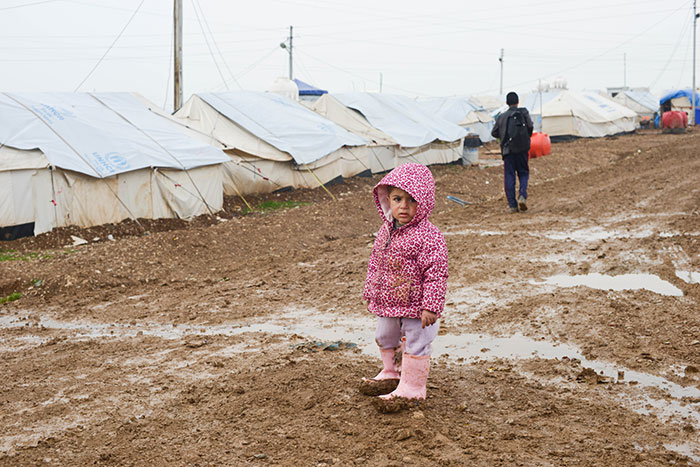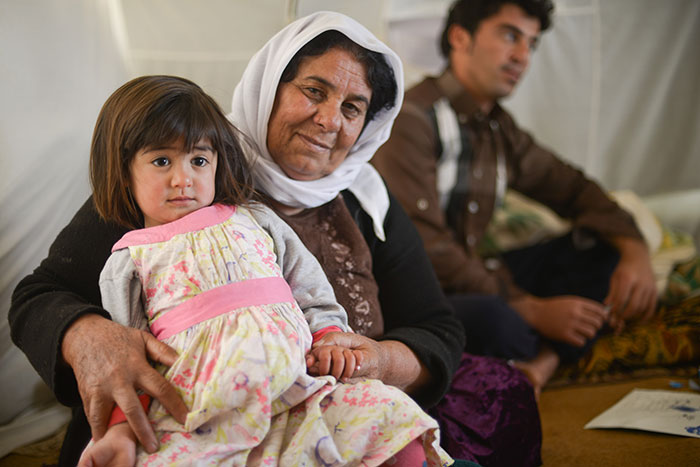Last August, the world watched in horror as the extremist armed group Islamic State, also known as ISIS, attacked Iraq’s Yezidi community. Thousands fled without food or water into the nearby Sinjar mountains, but ISIS fighters waylaid many, executing men and abducting thousands of people, mainly women and children. Rumors of forced marriage and enslavement of Yezidi girls and women swirled, and were later confirmed as a trickle of women and girls – now numbering into the hundreds – escaped. Human Rights Watch researchers Samer Muscati and Rothna Begum interviewed 20 of these women and girls and shared their findings with Amy Braunschweiger.
Who are the Yezidis?

Samer: The Yezidis live in Iraq’s Nineveh province on land claimed by both the Kurdistan regional government and the Iraqi central government. They practice an ancient monotheistic religion, and Yezidis say they have been persecuted for hundreds of years because many consider them “heretics.” Violent attacks against Yezidis by Sunni Arab extremists escalated after the US-led invasion of Iraq in 2003. On August 14, 2007, four simultaneous truck bombings killed more than 300 Yezidis and wounded more than 700 in Sinjar district communities. Some Yezidi activists also faced intimidation and threats from Kurdistan government forces. Kurdistan authorities consider Yezidis to be Kurds and, therefore, Yezidi lands part of the Kurdistan region of Iraq. Thousands of Yezidi families have fled to Syria, Jordan, and elsewhere. Since 2003, but before the latest attack by ISIS, their numbers in Iraq had dropped from about 700,000 to 500,000. There are probably fewer now.
No one knows how many Yezidis have been killed by ISIS – they’re still uncovering mass graves. Very little information comes out of ISIS-controlled areas. Every family has been affected, has had a husband or son killed, a daughter abducted, or has had to flee. We visited informal settlements and the main camp, Khanke, near Dohuk, which houses more than 18,000 Yazidis, mainly from around the city of Sinjar, about a two-and-a-half hour drive away. The Yezidis are living in a virtual sea of displaced person tents and nearby unfinished buildings, which lack doors and heat, perched on windswept hills. The views from the hilltops are stunning on a sunny day, but there’s little to protect the people there from the cold.
In the camps you interviewed women and girls who escaped ISIS and made their way back home. What happened to them at the hands of ISIS?
Rothna: We heard stories of abuse ranging from being forced to wait on ISIS members hand and foot, to beatings, rape, electric shocks, forced marriage, and sexual slavery.

Samer: One girl said ISIS members, wanting to find out who “desecrated” their Quran, handcuffed and blindfolded her and two other girls, beat them with a cable, and then fired a gunshot into the air. Apparently, the girl told us, one of the many cats in the house had ripped the Quran.
Most of the girls we spoke with said they were transferred from one place to another, ultimately living in big houses or halls with between 5 and 60 other girls. During the course of the day, ISIS fighters would come in, pick a girl to take, and if she refused, she’d be slapped or beaten.
What happened to these girls when they returned home, especially considering the moral weight placed on their virginity?
Rothna: Virginity is a huge issue across the region. There is a stigma attached to the abducted women because they could have experienced sexual violence from the ISIS fighters – and it extends to their families. We know that in conflicts around the world, communities retaliate against women who are victims of sexual violence. Husbands leave wives, families abandon daughters. One of our biggest concerns was, would these women be treated violently after returning home?

That’s not what we found – in part thanks to the Yezidi religious leader, Baba Sheikh, who instructed the community to welcome back and not harm those who were abducted, forced to convert, or raped. Because of this, most families have welcomed back their female relatives. We didn’t interview Baba Sheikh, but we spoke with another religious leader, Baba Chawish. He welcomed us, and spoke calmly and with dignity, despite the chaos surrounding him. He told us how, over centuries, Yezidis have had to flee numerous attacks. This was just another crisis, he said, and his goal was to keep the community together as much as possible and, frankly, to survive.
The families we met just wanted to be reunited. They already had so many family members killed or abducted by ISIS, they just want their families back.
How are these girls doing?
Samer: It’s difficult for them, they’ve endured terrible abuses. For me, the hardest part was when they talked about their missing parents, or about how ISIS men separated them from their sister, and where could she be? It’s terrible to be a young girl and be abducted and endure horrific abuses, but then to also lose your family on top of that? One of the most common sentiments I heard was that their biggest wish is to be reunited with their families, as they don’t know how to be whole without them.
As a group, these were among the worst cases I have ever documented for Human Rights Watch, and that says a lot as I’ve documented a wide range of abuses for years in war-plagued Iraq – everything from torture in secret prisons to abuses against people displaced by the fighting.
One 12-year-old girl really stood out to me. Her shy disposition reminded me of my 12-year old cousin. The man who abducted her told her not to worry, that he’d treat her as he’d treat his own daughter. Then he drugged her and she woke up to see blood between her legs.
Was it difficult getting the girls to share their experiences? Samer, was the fact that you are an Iraqi Arab man an impediment?
It wasn’t helpful – many of the ISIS fighters there are Iraqi Arabs. But we worked with local activists who already knew the women and girls, which put everyone at ease. We are also extremely sensitive and careful not to re-traumatize survivors.
Had any of these girls become pregnant?
Rothna: We spoke to one who was pregnant at the time she escaped, but there are others that we heard of, and there will be more cases as more women and girls escape. Abortion is illegal in Iraq, but it’s allowed in certain circumstances, such as when a woman’s life is at risk. The law should be interpreted to cover cases of pregnancy as a result of rape. If the women choose to have the children, there should be a plan for them to keep the baby or not.
Now that they’ve returned to their community, what would you like to see for these girls?
Rothna: We want everyone who comes back to receive adequate medical and psychosocial treatment, as well as schooling for girls and employment skills training for women.

Additionally, doctors need to be better trained in examining women who have been sexually assaulted. The purpose of the examinations needs to be explained to the women and girls to get informed consent from them, and doctors should ask for consent both before and during the examination. Otherwise, the exams could be harmful and humiliating for women and girls, and make them feel like they have no control over their bodies – which is what they felt when they were abducted by ISIS.
Samer: We also found some nongovernmental organizations and journalists with no experience interviewing trauma victims documenting their stories. Some recorded their statements on video, which leads to the risk of them being identified publicly.
Rothna: One girl I spoke with, we call her “Noor,” seemed so much better adjusted than the others – despite being the only child left in her family. She smiled, joked around with us, and talked to us about her future. But she had an awful story. She was abducted at 15, and after being moved from place to place she lived in a house with other girls who were forcibly married off or sold one-by-one. She and a friend attempted suicide together – she showed me the scars on her wrists – but an ISIS member caught them and stopped them. When her friend was picked to be taken by an ISIS member, the girl begged the men to take her too, so she could stay with her friend. They agreed and took both girls to another house. There, two other men told them, “You are sold to us.” They then beat and raped them for five days until they escaped, breaking through the door while the men were away fighting.

When she first came to the camp, she looked like a ghost, people told us. She was reunited with her parents, who were traumatized after their only son, Noor’s brother, was executed in front of them. But Noor had her parents’ support. She said that she’d been to the hospital a few times, is receiving regular counseling, and is taking a sewing class. Her friend that she escaped with lives in a separate camp, and her father has taken her there to visit. Sometimes NGO activists take her out of the camp for social activities like going to the mall. She says she still has nightmares, but she’s healing. She’s going to be someone who can identify herself as a survivor, not just as a victim.
In some ways, Noor has come back to life.
Yes. And life in general is taking shape in the camps. You can see market stalls selling chewing gum, and you see the lengths people have to go to make these tents feel like home with rugs and pillows. Keeping their spaces clean. They’d survived the winter and were dealing with cold rains. It’s likely they’ll be there for months or even years to come.

A Yezidi girl after heavy rain at the Arbat camp for displaced persons outside Sulaimaniya, northern Iraq. © 2015 Samer Muscati/Human Rights Watch |

Layal, 4, and her grandmother at a displaced persons camp in Iraqi Kurdistan. The grandmother said 25 relatives are still missing after ISIS attacked their village. © 2015 Samer Muscati/Human Rights Watch |
Why haven’t all the girls received the same type of treatment as Noor?
Rothna: Of the 300 women and girls who have returned, only 100 have been identified by health authorities. The other 200 or so, their families likely don’t know these services are available. People need to get the word out.
The Yezidi camps are in Iraqi Kurdistan, and they are protected by Kurdistan’s forces. The local Kurdistan officials we spoke with have been trying to help get women and girls treatment and to aid those who escaped to return home safely. They told us that they want expert help in handling rape cases and trauma, and they need expert assistance and training, particularly in psychotherapy. They want to know how to help.
Samer: The Yezidis stopped dominating the news six months ago, but the crisis still exists. Needs are going unmet. And there is an enormous number of people that need help – especially as more and more women and girls escape ISIS.
|
|
|